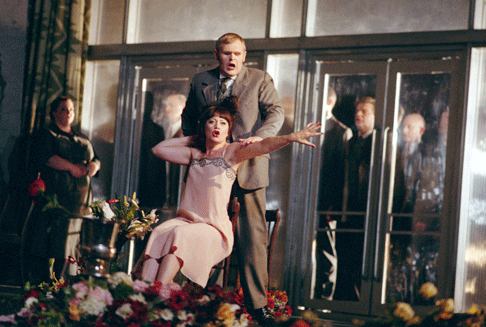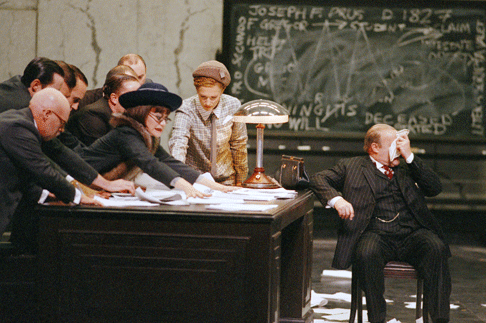“The Makropulos formula is a powerful metaphor for a fixation …
The moment Elina drinks it, she becomes an outlaw … But the story of
The Makropulos Case is not simply a personal one. It extends to an
idea about society’s rigid, collective destructiveness. Karel Čapek
and Leoš Janáček lived in a time of agonizing transition. For them
the 327-year old E. M. embodied the unwillingness of the past to give way to
the present. She stands for a society living beyond its moment.”
Charles Edwards’ striking set designs certainly capture this
conception; evoking the grim austerity of the pre-war Eastern Block, the single
set serves as lawyer’s office, theatre and boudoir, its forbidding
monochrome tones alleviated solely by the copious flowers which decorate the
Act 2 stage, offered in adulation by Emilia Marty’s chorus of idolising
worshippers. But, this ‘abstract’ and emblematic reading, is a long
way from Karel Čapek’s original philosophical comedy, from which
Janáček constructed his own libretto. And, while its certainly true that
the music considerably darkens the hues of Čapek’s social satire
and irony, this extraordinary opera surely remains at core a very human drama,
not least because the tale of obsession and passion seems permeated by the
aging composer’s own unrequited love for the young Kamilla Stösslova.
Man’s helplessness in the face of the inevitable and irrevocable
passing of time is a powerful theme in the work, and one which here is visually
reinforced by the interminable rise of the curtain in Act 1, the protracted
turning of the large wall-clock’s hands, and the legal clerks’
leisurely gathering of the documents which flutter from the ceiling, falling in
scattered heaps which emphasise the convoluted, ceaseless complexities of the
eponymous law suit. Alden and Edwards — with their over-sized black desk
and leather chair, and the flurry of annotations strewn across the blackboard
which looms on the office wall — have sought to recreate an ambience of
Kafkaesque menace and ambiguity, as the action lurches between stagnation and
frenzied confusion.
Indeed, such conflicts of tempo are built into the score, which swings
between static, fragmentary ostinatos and sudden orchestral outbursts; however,
underpinning the staggers and sways, is a steadily accumulating rhythmic
tension as the minutes of E.M.’s life tick unstoppably by.
Amanda Roocroft, tackling the role for the first time, was a cold,
calculating Elina Makropulos in her latest incarnation as the opera star,
Emilia Marty. Passionless and solipsistic, Roocroft’s stylised
expressionist gestures recalled the faux agonies of a Twenties starlet
of the silent screen. A convincingly cruel and callous femme fatale,
it is not entirely evident, however, why she should be so hypnotically alluring
to all men. Marching briskly about the stage, Roocroft conveyed Elina’s
nervous energy but somewhat lacked voluptuous allure. Roocroft took a little
time to settle, not quite finding the requisite opulent sensuousness in opening
Act; moreover, her diction lacked clarity (although the translation did not
always merit better – ill-judged comic one-liners and anachronistic
phrases such as ‘Cor blimey’ hardly seemed in keeping with
Alden’s and Edwards’ focused period vision). As the opera
progressed, warmth and depth increasingly characterised her tone, and Roocroft
released a soaring soprano of considerable beauty and power in the final act,
as Elina recalls and is humanised by her love for Pepi, the man whose actions
have given rise to the epic law case which has controlled and consumed so many
lives. Her desperate attempts to shake the elixir formula from her hands was
harrowing; obsessed with life, she now recognised that she has nothing to live
for — the terrible admission of her final confession.
 Amanda Roocroft as Emilia Marty and Christopher Turner as Janek
Amanda Roocroft as Emilia Marty and Christopher Turner as Janek
Roocroft was partnered by a team of excellent male leads. Peter
Hoare’s traumatiseGregor was superbly projected; a distressing portrait
of exposed vulnerability and intense passion, his anguished appeals and anger
conveyed the tortuous contradictions within all the men who want both to
possess and destroy Elina. Janáček’s score skilfully delineates a
rich array of character parts: strong performances by Andrew Shore, as a fussy
Dr Kolenatý, and Ashley Holland, as a muscular Prus, were matched by the
touching tenderness of Laura Mitchell’s Kristina and Christopher
Turner’s tense, nervous Janek. Ryland Davies’s Hauk was a little
weak in tone, but his portrayal of Marty’s feeble-minded former lover was
theatrically effective, and his duet with Roocroft powerfully conveyed the
pathos of Marty’s surge of affection for this aged former lover in Act
2.
Under the accomplished baton of Janáček specialist Richard Armstrong,
the ENO orchestra evocatively accompanied and commented on the stage action.
Armstrong emphasised the extreme contrasts of register and colour, percussive
bitterness alternating with tender lyricism. Initially, some of textures lacked
precise definition, particularly in the more conversational vocal passages,
where a sense of driving energy was not always maintained; and perhaps the
dramatic instrumental interjections could have been even more astringent and
discomforting. But, the explosive third climax was wonderfully controlled.
 Amanda Roocroft as Emilia Marty, Andrew Shore as Dr Kolenatý, Alasdair Elliot as Vitek and Laura Mitchell as Kristina
Amanda Roocroft as Emilia Marty, Andrew Shore as Dr Kolenatý, Alasdair Elliot as Vitek and Laura Mitchell as Kristina
Despite the undeniable affective power of this production, my difficulty
with this reading of the opera lies in Alden’s apparent lack of sympathy
for the essential ‘human’ aspects of the work. He envisages Elina
as possessing “the soul of a traumatized sixteen-year-old girl in the
body of powerful, indomitable woman”. Yet, surely her experiences over
three hundred years would have enabled her to learn, grow, and achieve a more
mature understanding of both herself and others? Alden essentially deprives
Elina of her status as a tragic heroine; he focuses instead on creating a
mechanistic vision of a 1920s dystopia – a reflection of
Janáček’s contemporary Prague perhaps – but while the result
is visually striking, he overlooks the fact that the preoccupations of drama
are shared by all men at all times and in all places. The steely lifelessness
of Adam Silverman’s intimidating lighting and the grey hardness of
Edwards’ monumental designs is matched by the emotional vacuum within
these pallid characters. Ultimately, they do not arouse our pity; in
Marty’s case we may share Prus’ post-coital disgust at her
barrenness and callousness — as, draped like a corpse, she seems
brutalised by life’s experiences.
Harrowing indeed; but the orchestral richness, complemented by sudden
swathes of light, as Marty embraces death surely intimate her ultimate
recognition of the true value of human life, a realisation which is both
edifying and uplifting? After, Janáček’s emotionally charged opera
pointedly reminds us that life only has value because of our awareness of our
mortality.
Claire Seymour
![Amanda Roocroft as Emilia Marty [Photo by Neil Libbert courtesy of English National Opera]](http://www.operatoday.com/The_Makropulos_Case_03.gif)

